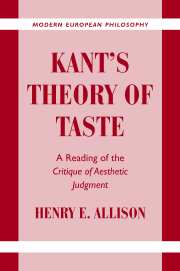Book contents
- Frontmatter
- Contents
- Acknowledgments
- Note on Sources and Key to Abbreviations and Translations
- Introduction
- PART I KANT'S CONCEPTION OF REFLECTIVE JUDGMENT
- PART II THE QUID FACTI AND THE QUID JURIS IN THE DOMAIN OF TASTE
- PART III THE MORAL AND SYSTEMATIC SIGNIFICANCE OF TASTE
- 9 Reflective Judgment and the Transition from Nature to Freedom
- 10 Beauty, Duty, and Interest: The Moral Significance of Natural Beauty
- 11 The Antinomy of Taste and Beauty as a Symbol of Morality
- PART IV PARERGA TO THE THEORY OF TASTE
- Notes
- Bibliography
- Index
9 - Reflective Judgment and the Transition from Nature to Freedom
Published online by Cambridge University Press: 18 January 2010
- Frontmatter
- Contents
- Acknowledgments
- Note on Sources and Key to Abbreviations and Translations
- Introduction
- PART I KANT'S CONCEPTION OF REFLECTIVE JUDGMENT
- PART II THE QUID FACTI AND THE QUID JURIS IN THE DOMAIN OF TASTE
- PART III THE MORAL AND SYSTEMATIC SIGNIFICANCE OF TASTE
- 9 Reflective Judgment and the Transition from Nature to Freedom
- 10 Beauty, Duty, and Interest: The Moral Significance of Natural Beauty
- 11 The Antinomy of Taste and Beauty as a Symbol of Morality
- PART IV PARERGA TO THE THEORY OF TASTE
- Notes
- Bibliography
- Index
Summary
The focus of the preceding part of this study was on the claim to normativity inherent in the pure judgment of taste. It was argued, first, that the Analytic of the Beautiful addresses the quid facti by determining the conditions under which a judgment of taste can be pure and, second, that the Deduction resolves the quid juris by showing that, on the one hand, a pure judgment of taste makes a rightful demand for agreement but that, on the other hand, it is impossible to determine with certainty whether any given judgment of taste is pure. Although Kant makes passing allusions to the issue, particularly in §17 and §22, my discussion abstracted from the whole question of the connection between taste and morality, which for many interpreters is the key to the grounding of the normativity of taste itself. This was done in order to show that, contrary to these interpreters, the grounding of the pure judgment of taste is independent of any connection taste may have with morality.
It should not be inferred from this, however, that the connection with morality is merely a side issue, peripheral to the main business of the Critique of Aesthetic Judgment. On the contrary, we shall see that this connection lies at the very heart of Kant's project, though it presupposes, and therefore cannot help to ground, the normativity of the pure judgment of taste.
- Type
- Chapter
- Information
- Kant's Theory of TasteA Reading of the Critique of Aesthetic Judgment, pp. 195 - 218Publisher: Cambridge University PressPrint publication year: 2001

